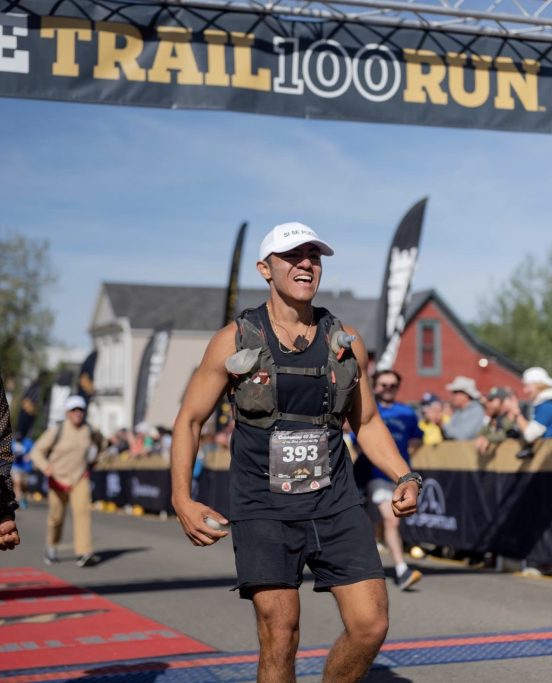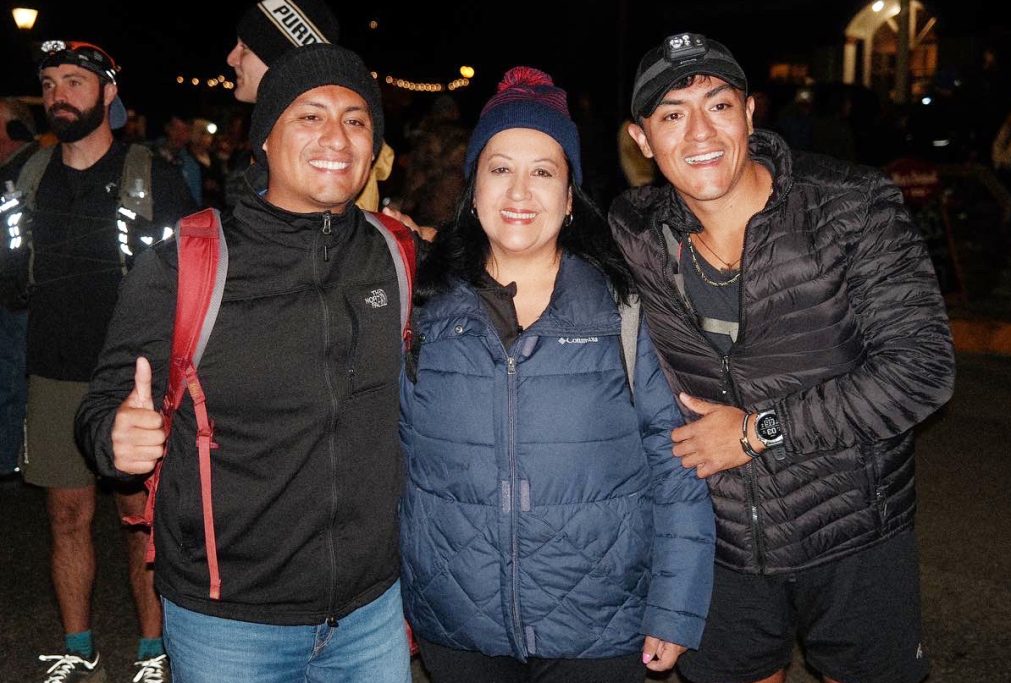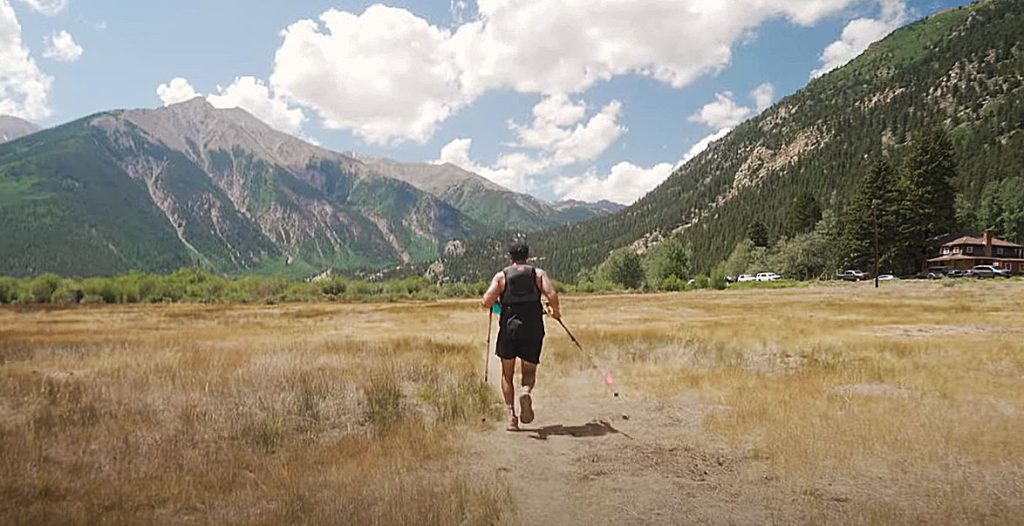Finding Your Leadville
By: Jeff Joiner | December 13, 2023

Running in Colorado, Daniel Flores BS’15 reached a low point. The sun had set, and he was starting down a mountain awash in darkness with only a headlamp to light the boulder-strewn trail. That’s when he began to feel the blisters.
“I’d never experienced anything like that,” he said. “Every step was painful.”
Flores is a distance runner, but not mere distances like 26-mile marathons – though he has run several of those. In August, Flores completed a 100-mile race in the Rocky Mountains beginning in Leadville, Colorado, completing it in just over 29.5 hours. What’s amazing about Flores’ achievement is that he started running just three years prior.
Flores, a 30-year-old Dallas technology salesperson, began jogging to improve his health and remembers struggling to run a single mile. But he didn’t quit and began competing in longer and longer races – from 5-kilometer and 10-kilometer races to half and then full marathons and triathlons. Earlier this year he completed a 50-mile race in Houston that inspired him to seek out the next challenge. He chose the Leadville Trail 100, a race that starts at an elevation of 10,158 feet and includes more than 15,000 feet of elevation gain.
“I’m very competitive with myself,” Flores said. “I want to push myself and accomplish more. That’s something that’s inside of me, so the more I ran, the healthier I became physically and mentally and the longer I wanted to go.”
For Flores, training for and completing a 100-mile run in the mountains became something much more than a personal test. He and a friend, Ramon Morales, decided to film his training and the Leadville race to make a documentary to inspire others. Flores even included his mantra, “si se puede” or “yes, you can,” in the title of the documentary.
“I told my friend we have something special here and that we should document it and create something meaningful that can inspire the Hispanic community to go for things that are challenging and to show that they’re capable of more than they know,” Flores said. “It doesn’t have to be a race. It could be getting a degree or something else that seems impossible. I want people to find their Leadville.”
With the 50-mile race under his belt, Flores began prepping for Leadville. His training regimen included daily 4:30 or 5 a.m. road runs, usually in downtown Dallas, followed by strength training. His plan included workouts that simulated running at elevation and a 40-mile all-night run to prepare mentally for the race segment that takes place after dark.
He gradually increased his distances, reaching a peak week of 102 miles three weeks prior to the Colorado race.
“That was tough because you have to get in so many miles,” he said. “You’re running 10 to 13 miles a day, but that gave me the confidence that I could do 100 miles at Leadville.”
Though proper nutrition is a key to ultra distance running, Flores realized that he could almost eat anything and still lose weight. At the height of his training, he estimates he was burning nearly 4,000 calories a day.
A race like Leadville is only possible with a dedicated support team to help the runner during the race. Flores recruited 19 friends and family members, including his mother and brother, to man aid stations along the route, providing food, water and clothing when the temperature dropped and, most importantly, loud, raucous cheers when Flores arrived.
With a precise schedule in place that would allow him to complete the run in less than 30 hours to avoid disqualification, Flores could only spend 5 minutes at each aid station where he gulped down food and refilled water bottles. The 50-mile mark, roughly 12 hours into the event, is where the race really begins, Flores said. That’s the point where legs are tired and the mind begins to doubt the sanity of running so far.
“You really start questioning yourself, ‘Am I going to make it?’” he said.
An aid station at mile 72 is where Flores had his blistered feet checked by medical staff after descending from the race’s highest point, the 12,500-foot Hope Pass, which runners climb and descend twice. The medical staff could only offer him Band-Aids and gauze dressing to enable him to finish the remaining 28 miles.
“That was the low point,” Flores said. “My feet were destroyed; it was dark and cold, and I had several hours left.”
During the race, Flores spent time thinking about his past and about how he, his mother and brother immigrated to the United States from Mexico when he was 10. Driven to complete a 100-mile race was not that much different, he said, than what he and his family endured in the U.S. where he started school without knowing how to speak English and his mom worked multiple jobs to make ends meet.

“I just kept pushing and thinking about inspiring others,” Flores said. “And I kept thinking about how 10-year-old Daniel would be proud of Daniel now.”
By late in the race, with his cutoff time looming, it became a struggle to place one step in front of another. Flores said he reached a point where he alternated between walking and running. As he approached the finish in Leadville, his support team joined him in the final few yards, which he completed with 25 minutes to spare before disqualification.
“It was a dream come true in the sense that I had visualized the finish the whole time I was training,” Flores said. “So, in my head I saw myself crossing the finish line even before I started. It was beautiful.”
In November, Flores premiered the documentary “Si Se Puede: Road to Leadville,” filmed and produced by Morales, at the Latino Cultural Center in Dallas. Flores said he believes members of the Hispanic community are connecting with his story.
“The cool thing about the documentary is that it tells a story,” Flores said. “It’s not just about a race. It shares my journey as a Mexican immigrant coming to the U.S.”
Flores hasn’t stopped running after Leadville and is now training for his next goal – completing a marathon with a time fast enough to qualify for the Boston Marathon.
Flores also maintains close ties to UT Dallas, where he earned a bachelor’s degree in finance. He recently joined the advisory council for UTD’s Center for Children and Families, a research center where scholars and students study childhood development. Flores said his experiences growing up with a single mom in a new country inspired his involvement with the center.

Watch Flores’ documentary “Si Se Puede: Road to Leadville.”